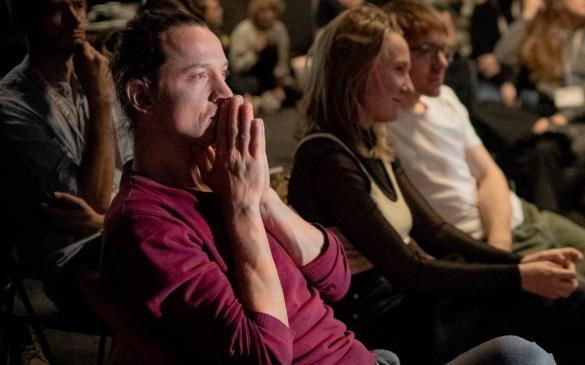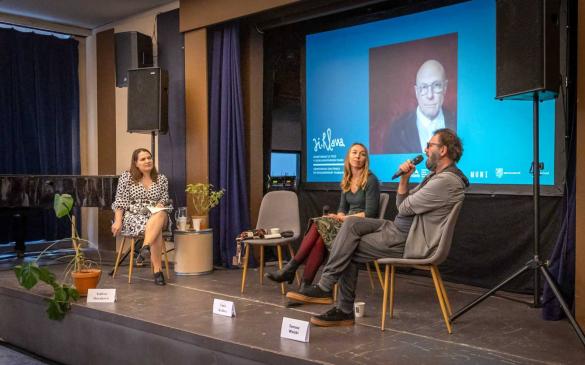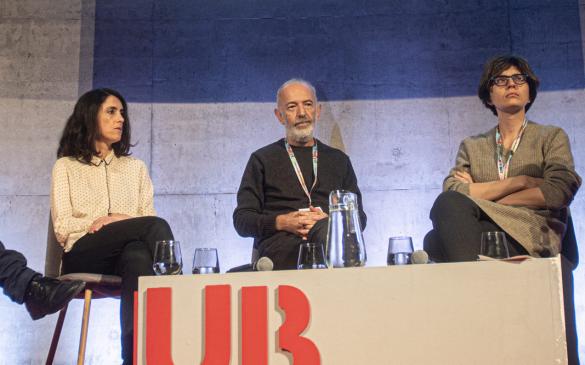|
Marta Balaga She is a film journalist based in Finland and Poland. She has published in Cineuropa, Variety and regularly contributes to Finnish film magazine Episodii. |
|
Tomáš Elšík He is a graduate of FAMU. His documentary Central Bus Station (2018) portrays life in Tel Aviv’s terminal and has been screened internationally. He focuses on the topic of artificial intelligence in film editing. |
|
Katerina Cizek Katerina Cizek is an award-winning documentarian, producer, and researcher with more than 25 years of experience in media and emerging technologies. She is the Artistic Director and Co-founder of the Co-Creation Studio at the MIT Open Documentary Lab, where she leads research and projects connecting art, documentary, and journalism with new technologies. Together with William Uricchio, she co-authored Collective Wisdom (MIT Press, 2022), the first major field study on co-creation in media. Previously, she worked as a documentary director at the National Film Board of Canada, where she led groundbreaking digital projects such as HIGHRISE and Filmmaker-in-Residence. A Peabody and Emmy Award winner, she currently serves as Chair of the Interactive Board of Jurors for the Peabody Awards. |
|
Jan Gogola jr. He is a former program director at Czech Television Brno, lectures at FAMU, and currently also at UTB in Zlín. His reflective and stylized films often draw on everyday life and examine it philosophically (diary, essay, happening, performance). His filmography includes, for example, The Prison of History (2023), Eternal Jožo or How I Met a Star (2020), and Excursions or History of the Present (2015). As a dramaturg, he has collaborated on projects such as Caught in the Net, Czech Dream and Jan Palach. He leads masterclasses at international festivals (DOK Leipzig, Jihlava IDFF, DOCsk) and publishes essays in the media and books. |
|
Veronika Kováč She is a doctoral student at the Department of Media Studies and Journalism and co-organizes and produces the annual Ethics in Documentary Film conference as part of the International Documentary Film Festival in Jihlava. Her dissertation focuses on the moral dilemmas faced by Slovak filmmakers in relation to polarizing topics. She has worked as an intern at RTVS and is currently preparing a documentary film on surrogacy with the support of the Slovak Audiovisual Fund. |
|
Lucie Králová Her films have been screened at numerous international festivals and have won many awards, including three awards for best Czech documentary at the Jihlava International Documentary Film Festival (2022 KaprKód, 2005 Prodáno, 2003 Zlopověstné dítě), and the Crystal Globe for Best Feature-Length Documentary at the Karlovy Vary International Film Festival (2007, Ztracená dovolená). She works at FAMU, where she leads a creative workshop and is a member of the departmental council. Her documentary opera KaprKód, which uses amateur archives (premiered at Vision du Reel), won the Golden Heynal for Best Music Documentary at the Krakow International Film Festival, the Czech Film Critics' Award, and three Czech Lion nominations. She is the author of the book Rozumět televizi a textům (Understanding Television and Texts), which focuses primarily on the impact of institutional mechanisms on documentary film. |
|
Veronika Macurová Křížová She is specializing in AI law and ethics, IP, and personality rights. Holds an LL.M. from UC Berkeley and advises clients in Europe and beyond. She lectures and actively conducts research in the field of artificial intelligence regulation in the creative industry. |
|
Marta Materska-Samek She specializing in film and the creative industries. She holds a Ph.D. in Management Sciences from Jagiellonian University, where she works in the Department of Management, Media Economics, and Advertising. She co-led the ErasmusXR project (2020–2023), nominated for the EDUInspiration Awards 2024, and contributed to the creation of the EIT Culture & Creativity community within Una Europa, where she served as Interim Education Director. Marta is involved in Horizon Europe projects such as PACESETTERS and IMPULSE and chairs the Working Group for Creative Industries at Poland’s Ministry of Development and Technology. |
|
Jan Motal His research and creative work focuses on the relationship between radicalism and dialogue. He specializes primarily in media and communication ethics. He works at Masaryk University, where he heads the Center for Media Ethics and Dialogue. He also teaches at the Theater Faculty of JAMU and the Cyril and Methodius Faculty of Theology at UPOL. As an expert, he collaborates with the Independent Journalism Foundation and the Network for the Protection of Democracy, is a member of the editorial board of Deník N, and serves on the international jury of the Daphne Caruana Galizia Prize for Journalism. He has written several books focusing on the issues of radicalism and dialogue in art and religion, such as Radical Dramaturgy (2022) and Radical Theology (2024). As part of the art group Dílo, he is involved in experimental stage production and film. |
|
Tomáš Rampula He explores the intersection of art, technology, and storytelling. After studying architecture at the Czech Technical University in Prague, he devoted himself to connecting architecture, sound, and space through video and installation at the Bezalel Academy in Jerusalem, where he studied Screen-Based Arts. He continued his studies at the Center for Audiovisual Studies at FAMU, where he received his master's degree in 2024. In his work, he develops a distinctive film language based on the use of tools such as game engines, photogrammetry, CGI, and artificial intelligence. He presented his film Místo (2020) at the Ji.hlava International Festival of Documentary Films and is now presenting SnowBlind, a film created using neural networks. |
|
Szilvia Ruszev She is a media artist and practice-based researcher working across media. She is currently Lecturer in Film Production at University College London. She has led an AHRC and BRAID funded research Shared Post-Human Imagination investigating responsible use if generative AI in media production. |
|
Miriam Ryndová She is the founder of Future Memory Lab. She studied aesthetics, Slovak language, literature, and film studies in the Artes Liberales program in 2002. She worked as a film journalist for Vlna magazine and the Nitra International Theater Festival (Slovakia), organized a film conference for the Soros Center for Contemporary Art in Bratislava, and worked for Designblok and FAMU – the Department of Documentary Film in Prague. Miriam Ryndová is an experienced curator and program manager in the field of documentary film. She worked at the Institute of Documentary Film, where she founded the Silver Eye Awards and led the East Doc Platform. She founded the Doc Tank and Move It On programs, focused on experimental documentaries and film marketing. She has served as a jury member at DOK Leipzig, Visions du Réel, and other festivals, and has lectured on transmedia and international co-productions. |
|
Andreea Lăcătuș Her work encompasses fiction, documentary, and interdisciplinary projects. She is the Festival Director of One World Romania International Documentary and Human Rights Film Festival and founder of co/laborator film, a platform dedicated to collaborative and socially engaged filmmaking practices. Her artistic practice foregrounds ethical considerations, emphasizing collaboration, inclusivity, and critical engagement with communities, particularly those in vulnerable or marginalized contexts. Currently, she is a PhD candidate at The National University of Theatre and Film Bucharest, where her research focuses on film ethics and the responsibilities of filmmakers working with vulnerable populations. |
|
Dominic Lees He is an experienced director of factual, documentary and drama content for television, and an award-winning feature film director. He is Associate Professor in Filmmaking at the University of Reading, UK, where he leads research exploring the potential of Generative AI in film, as well as its ethical and legal problems. He also works as specialist advisor on film and HETV to the UK Parliament. Dominic speaks internationally on the subject of AI in filmmaking, and leads workshops supporting directors in the responsible use of AI. His recent published work has investigated the use of deepfakes and GenAI in documentary film production. |
|
Piotr Winiewicz Piotr’s debut feature film, About a Hero, which opened the 2024 International Documentary Film Festival Amsterdam (IDFA) is an adaptation of a script written by an AI trained by the work of Werner Herzog. The narrative it produced, ironically self-reflective, is intertwined with a series of interviews with artists, philosophers and scientists reflecting on the notion of originality, authenticity, immortality, and the soul in the age of AI. He is a graduate from The Academy of Fine Arts in Vienna, where his diploma film On High in White Tomorrows was awarded the Wurdigung Prize. His work focuses on blurred lines between reality and fiction. |














